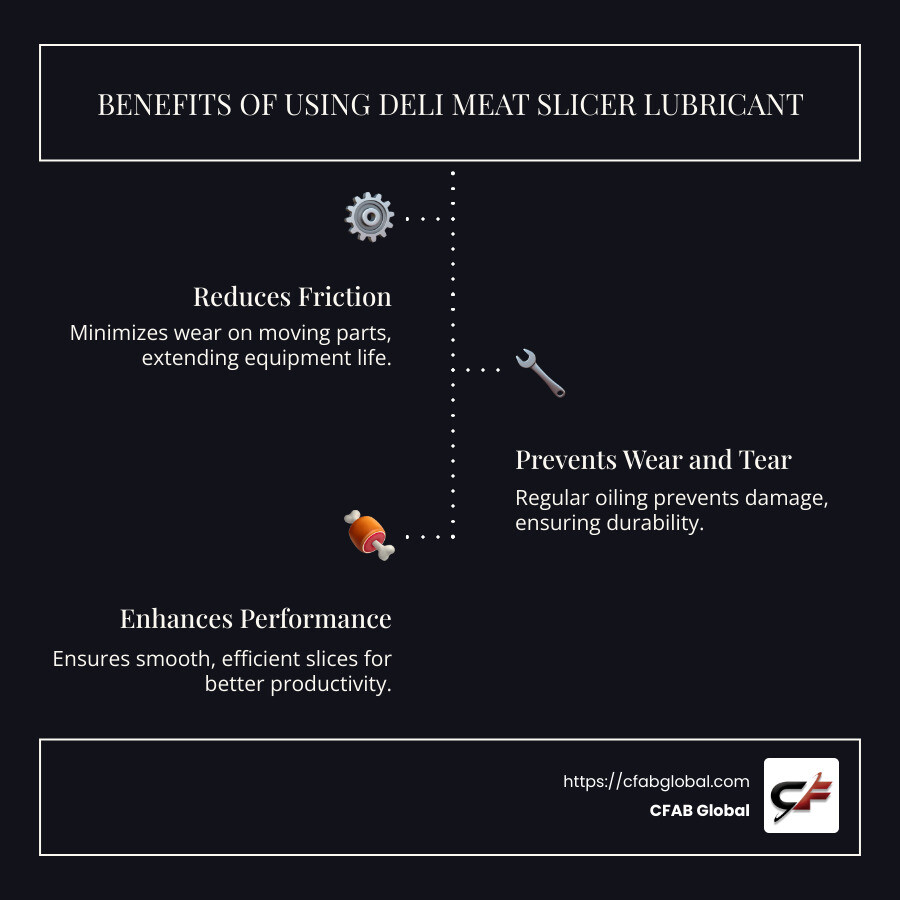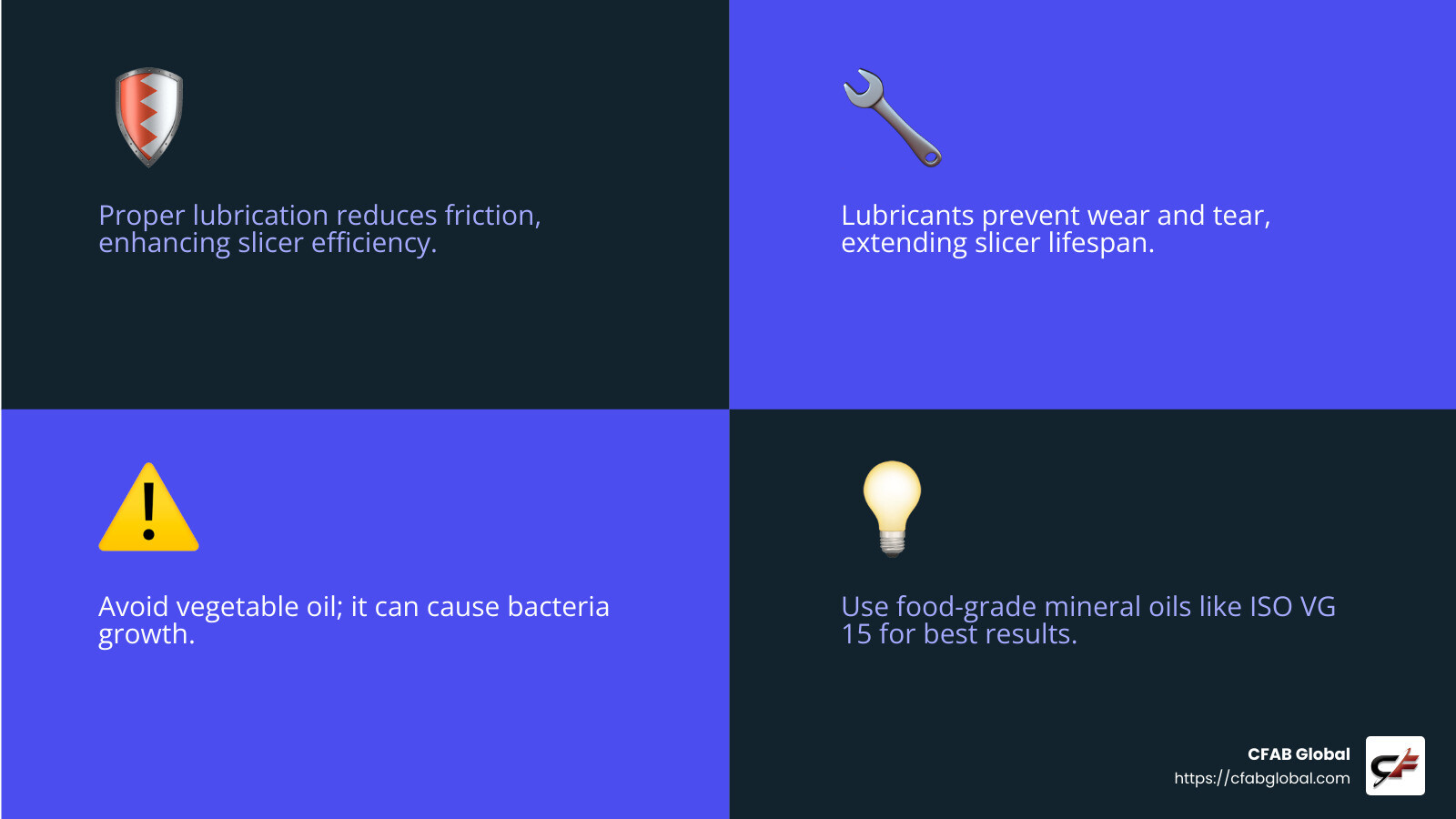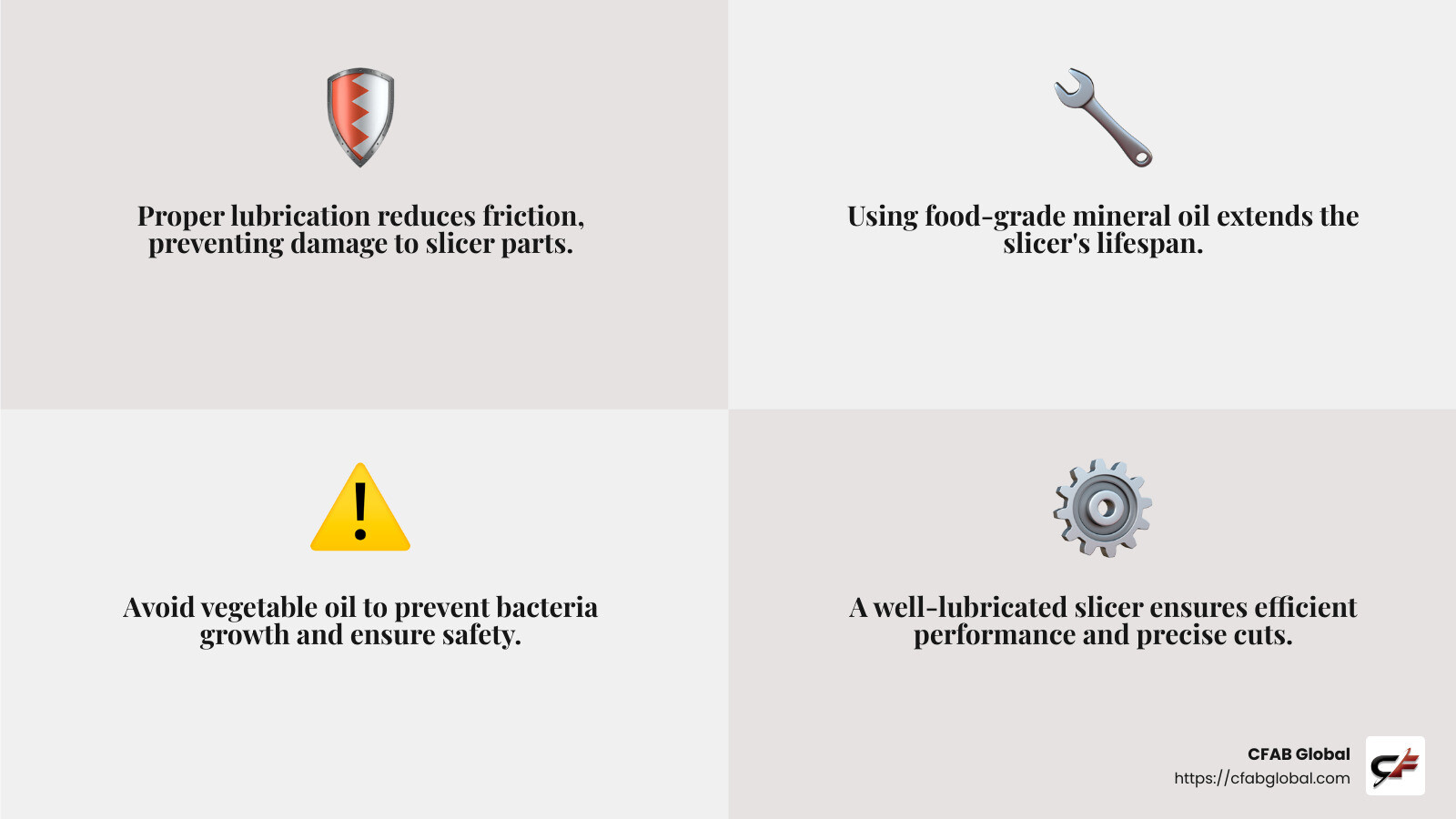Why use deli meat slicer lubricant is crucial for maintaining your slicer’s performance and hygiene:
- Reduces Friction: Proper lubrication minimizes wear and tear on moving parts.
- Prevents Wear and Tear: Regular oiling extends the life of your slicer.
- Improves Performance: Ensures smooth and efficient slices, saving time and effort.
Keeping your deli slicer in top condition is essential for efficiency and hygiene. Why use deli meat slicer lubricant is a common question, and the answer lies in its ability to protect and prolong the life of your equipment. Lubricants like ISO VG 15 white mineral oil form a protective film over crucial parts, reducing friction and preventing wear. This not only improves the slicer’s cutting performance but also ensures food safety by preventing buildup and potential contamination.
As Todd Cleppe, I’ve spent decades improving machinery solutions, particularly focusing on lubrication systems. My work in food processing has highlighted the critical role of specialized lubricants in reducing downtime and maintenance costs, making them indispensable for efficient operations.

Why use deli meat slicer lubricant terms to know:
– how to clean meat slicer
– what lubricants are safe for a meat slicer
Why Use Deli Meat Slicer Lubricant
Benefits of Proper Lubrication
Using the right deli meat slicer lubricant is crucial for keeping your slicer running smoothly. One of the main benefits is reducing friction between moving parts. This not only makes slicing easier but also prevents parts from grinding against each other, which can lead to damage over time.
Proper lubrication also prevents wear and tear. By forming a protective layer, lubricants like ISO VG 15 white mineral oil help extend the life of your slicer. This means fewer repairs and replacements, saving you both time and money in the long run.
Another advantage is improved performance. A well-lubricated slicer operates more efficiently, producing clean, even slices with minimal effort. This can be especially important in busy settings where speed and precision are key.

Risks of Improper Lubrication
Using the wrong type of lubricant can cause serious problems. For instance, vegetable oil is not recommended for deli slicers. It tends to be too viscous and sticky, which can create an unsafe working environment. It also stays wet, allowing food debris to stick to it. This can form an abrasive paste that accelerates wear and tear, leading to frequent maintenance and potential repairs.
Moreover, vegetable oil can promote bacteria growth, which is a significant concern, especially if your slicer is used for raw meat. Bacteria can contaminate food, posing health risks and violating food safety standards.
It’s essential to use food-grade lubricants to ensure safety and compliance. These are designed to be safe in food environments, reducing the risk of contamination and keeping your slicer in optimal condition.
In summary, using the right lubricant is not just about keeping your slicer running well; it’s about ensuring safety and efficiency. For reliable and effective lubrication, consider solutions from trusted providers like Texas Refinery Corp.

Understanding these benefits and risks underscores the importance of choosing the right lubricant for your deli slicer. In the next section, we’ll explore the key areas that need regular lubrication to maintain your slicer’s performance and longevity.
Key Areas to Lubricate on a Deli Slicer
To keep your deli slicer in top shape, focus on key areas that require regular lubrication. These areas include blade guards, food trays, and meat pushers. Each of these components plays a crucial role in the slicer’s operation and needs proper care to ensure smooth functioning.
Blade Guards
The blade guard is a critical safety feature on your slicer. It protects users from accidental cuts and keeps the blade clean. Regular lubrication prevents the guard from sticking or jamming, which can happen if food particles build up. By keeping the blade guard well-lubricated, you ensure it operates smoothly, reducing the risk of accidents and maintaining hygiene. For optimal performance, consider using Texas Refinery Corp’s lubricants to ensure safety and efficiency.
Food Trays
Food trays are where the action happens—they hold the meat or cheese as it moves through the slicer. Lubricating the sliding mechanisms beneath the tray ensures that it moves effortlessly. This not only makes slicing more efficient but also prevents unnecessary strain on the motor, extending the life of your slicer. Using high-quality lubricants from Texas Refinery Corp can help maintain the smooth operation of these components.
Meat Pushers
The meat pusher helps guide the food towards the blade, ensuring even slices. Without proper lubrication, the pusher can become difficult to move, leading to uneven cuts and increased wear on the slicer. A well-lubricated pusher glides smoothly, making the slicing process easier and more precise. Ensure you use the right lubricants, such as those from Texas Refinery Corp, to keep your equipment in top condition.
Regular Maintenance Schedule
To keep everything running smoothly, establish a weekly lubrication routine. This includes checking and lubricating the blade guards, food trays, and meat pushers. Additionally, perform periodic checks on other moving parts to catch any issues early. Regular maintenance not only prolongs the life of your slicer but also ensures it operates safely and efficiently.
By focusing on these key areas and maintaining a consistent lubrication schedule, you’ll keep your deli slicer performing at its best. This not only saves time and money on repairs but also improves the quality of your slices, whether you’re preparing a gourmet sandwich or serving up deli meats.
In the next section, we’ll discuss the recommended lubricants for deli slicers to ensure optimal performance and safety.
Recommended Lubricants for Deli Slicers
When it comes to keeping your deli slicer running smoothly, choosing the right lubricant is crucial. Using the proper lubricant helps reduce friction, prevents wear and tear, and ensures the slicer operates efficiently. Let’s explore the recommended lubricants and how to avoid common mistakes in maintaining your slicer.
ISO VG 15 and White Mineral Oil
For deli slicers, ISO VG 15 grade white mineral oil is highly recommended. This type of oil is specifically formulated to provide optimal lubrication without compromising on food safety. It’s tasteless and odorless, ensuring that it won’t affect the flavor or smell of your deli products. Using this oil regularly can significantly prolong the life of your slicer by minimizing friction and wear on its components.
Texas Refinery Corp Products
Another excellent choice for deli slicer lubrication is Texas Refinery Corp products. Known for their exceptional quality, these lubricants are designed to protect your investment by providing superior lubrication. They are engineered to extend equipment life, reduce maintenance costs, and improve overall performance. By opting for Texas Refinery Corp lubricants, you ensure that your deli slicer receives the best care possible.
Avoiding Common Mistakes
No Vegetable Oil
One of the most common mistakes is using vegetable oil for lubrication. While it might seem like a convenient option, vegetable oil is not suitable for deli slicers. It tends to be viscous and sticky, which can lead to food particles adhering to it. This creates an abrasive paste that accelerates wear and tear on your machine. Moreover, vegetable oil can harbor bacteria, posing a risk of contamination, especially when slicing raw meats.
Proper Cleaning Before Lubrication
Before applying any lubricant, clean and dry all areas thoroughly. Any leftover food particles or moisture can interfere with the lubricant’s effectiveness, leading to potential issues down the line. Start by wiping down the slicer with a clean, dry cloth, and ensure all surfaces are free from debris. This simple step ensures that the lubricant can do its job effectively, keeping your slicer in top condition.
By choosing the right lubricants and following proper maintenance practices, you can keep your deli slicer operating smoothly and safely. In the next section, we’ll address some frequently asked questions about deli slicer lubrication to help you get the most out of your equipment.
Frequently Asked Questions about Deli Slicer Lubrication
Why is mineral oil preferred for deli slicers?
Mineral oil is the go-to choice for lubricating deli slicers because it is tasteless and odorless. This means it won’t alter the flavor or aroma of the food you slice. Additionally, mineral oil like the ISO VG 15 grade is specifically designed to be food-safe, providing effective lubrication without compromising safety. It helps ensure that your slicer operates smoothly, reducing friction and wear on the machine’s components. For top-notch protection, consider using products from Texas Refinery Corp, which are known for their high-quality lubrication solutions.
How often should I lubricate my deli slicer?
Regular maintenance is key to keeping your deli slicer in top shape. Weekly lubrication is recommended for essential components like the counterweight guide bar and the sliding bar of the carriage. It’s important to establish a periodic maintenance schedule to check and lubricate other parts like the slice thickness regulator cam and the blade regulator shaft. By following a consistent maintenance routine, you can ensure your slicer remains efficient and extends its lifespan.
What parts of the slicer need regular lubrication?
To keep your deli slicer functioning smoothly, focus on lubricating key areas:
- Blade Guards: Lubricating these helps ensure smooth operation and prevents rust.
- Transport Rod: This part is crucial for the movement of the slicer carriage. Regular lubrication minimizes friction and wear.
- Food Trays and Meat Pushers: Although not directly involved in slicing, keeping these parts lubricated helps maintain overall efficiency and ease of use.
By addressing these frequently asked questions, you can better understand the importance of proper lubrication and maintenance for your deli slicer. This knowledge will help you maintain your equipment’s performance and longevity, ensuring it serves you well for years to come.
Conclusion
At CFAB Global, we understand how crucial it is to keep your deli slicers running smoothly and efficiently. Our Machine Reliability Program is designed to ensure your equipment performs at its best, minimizing downtime and extending its lifespan. We provide custom solutions that address your specific needs, helping you maintain optimal performance and maximize your return on investment.
Our program offers a customized approach that includes personalized analysis and support, ensuring your machinery operates at peak performance. Whether you’re in manufacturing, construction, agriculture, or energy, CFAB Global is here to support your operational goals with our expertise and advanced solutions.
By choosing CFAB Global, you benefit from our commitment to proactive maintenance strategies that prevent breakdowns before they occur. We work closely with you to develop a maintenance plan that fits your unique requirements, ensuring your deli slicers and other machinery remain reliable and efficient.
For more information on how our Machine Reliability Program can improve your operations, visit our service page. Let us help you achieve greater productivity and efficiency with our top-tier machinery solutions.






